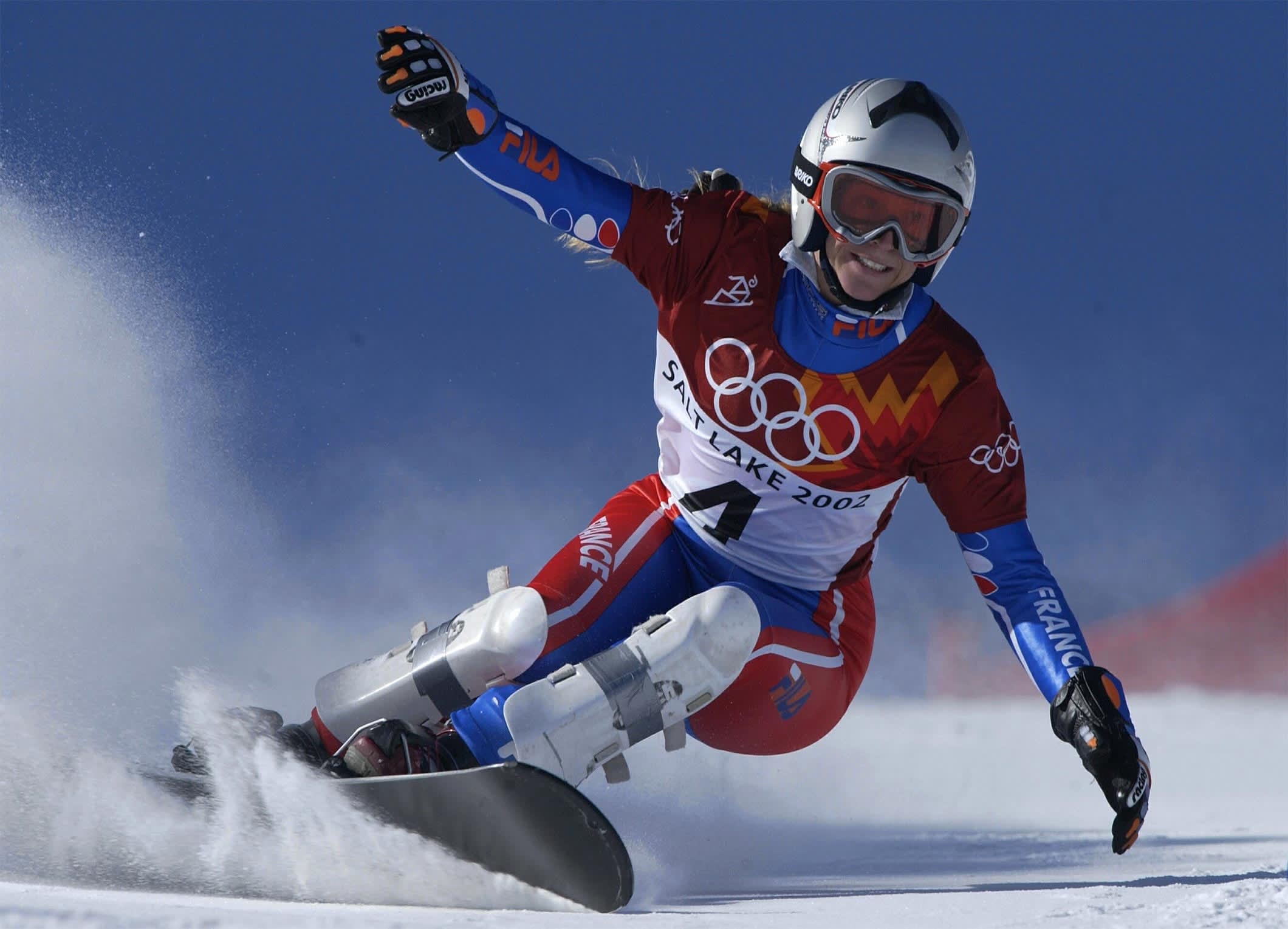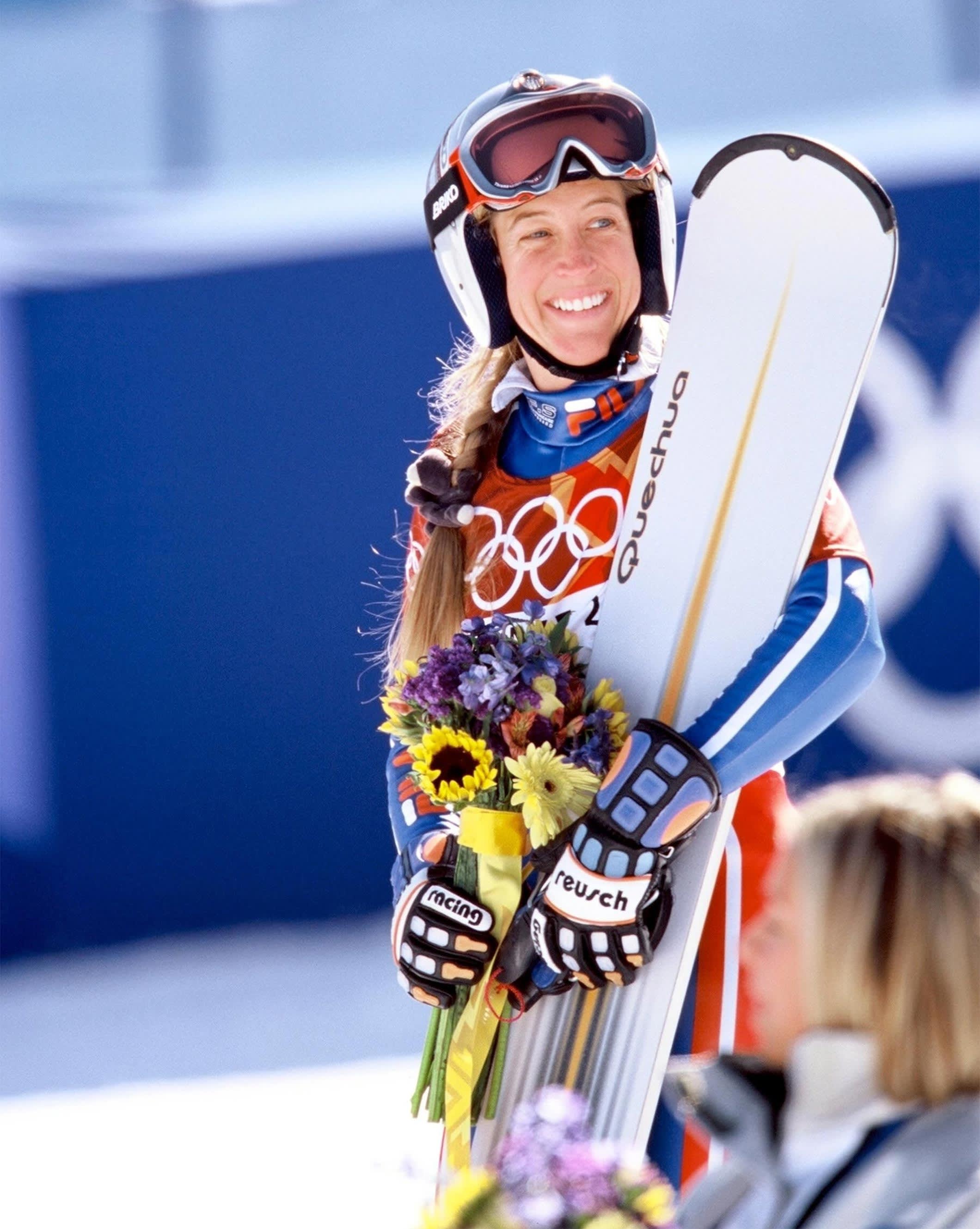Twenty-two years ago, Karine Ruby became the first Olympic snowboard champion
With 67 Snowboarding World Cup victories, Karine Ruby holds a record that no one has yet come close to equalling. Her discipline made its Olympic debut at Nagano 1998, and the first women’s event was held on 10 February – a giant slalom on the snow of Mount Yakebitai. The 20-year-old French athlete won by some margin and wrote her name into the history books.
The Olympic programme now features five snowboarding events for both men and women. These competitions are split into races (parallel giant slalom and snowboard cross) and freestyle competitions (halfpipe, slopestyle and big air). It was snowboarding that led the way each time with the introduction of freestyle competitions at the Games, with skiing then following suit.
Snowboarding has its origins in surfing and was developed on the snowy mountain slopes of North America in the 1970s, eventually evolving into a competition sport. It made its debut at the Olympic Winter Games in Nagano in 1998 with two events: halfpipe, in which a certain Shaun White made a name for himself, and the giant slalom, in a format that was subsequently abandoned, whereby competitors had to race individually against the clock on two runs. The parallel aspect was introduced to the event at the Olympics at Salt Lake City 2002.

A trailblazer with an exceptional record
Competitive international snowboarding has its trailblazers, and first among them was Karine Ruby. She was born on 4 January 1978 in Bonneville (Haute-Savoie, France) and grew up in Argentière in the commune of Chamonix, just a stone’s throw away from the Grand Montets cable car, which ascends to one of the most beautiful high-mountain and ski areas in the world, in the shadow of the Aiguille Verte. When a gently undulating ski run (Les Chosalets) was built and a small chairlift installed just behind Ruby’s family home, her destiny was all but mapped out. But she still needed to give everything she had, and that was exactly what she did. Her childhood dream was to be a mountain guide, one she pursued while taking up the new discipline of snowboarding on the small slope situated right behind her house. She started competing at the age of 14, undaunted by the fact that her opponents were all boys.
Ruby claimed her first two victories in international competition – in the parallel giant slalom and the giant slalom – in quick succession in December 1994, aged 16. The snowboard overall standings and crystal globe did not yet exist, but the first Snowboard World Cup was staged in the 1995-1996 season, and Ruby emerged victorious. Drawing on her technical ability, mental strength and an extraordinary desire to push herself to the limit, Ruby enjoyed a phenomenal run of success up until the 2005-2006 season, scoring a record 67 Snowboard World Cup victories in all disciplines, and winning six world titles, six crystal globes for topping the overall World Cup standings, 13 other snowboard trophies and two Olympic medals.
Historic victory in Nagano in the swirling snow
On Tuesday 10 February 1998, the snow was driving down on Mount Yakebitai, the location of the giant slalom run at Kanbayashi Snowboard Park in Yamanouchi. Wearing the number 2 bib, Ruby took control, mastering both the weather conditions and the course itself to open up a big lead on the first run, two seconds ahead of compatriot Isabelle Blanc, with the rest of the field even further behind.
Adopting a more cautious approach on her second run, Ruby, who had just turned 20, recorded the sixth fastest time. Blanc was closing in and was ahead at the split, but she then missed the 36th and final gate, and was disqualified. Ruby was crowned Olympic champion with a lead of 1.83 seconds over Germany’s Heidi Renoth. Austria’s Brigitte Köck took bronze, finishing 2.08 seconds behind Ruby. The young French athlete became her sport’s first ever Olympic champion, and found herself thrust into the media spotlight.
Following this historic victory, Ruby continued her global domination. She won three gold medals (parallel slalom, giant slalom and snowboard cross) at the 2001 World Championships in Madonna Di Campliglio. At the Olympic Winter Games Salt Lake City 2002 in Deer Valley, in what was now the parallel giant slalom, Ruby and Blanc both successfully navigated their way through to the final. This time, it was Blanc, from Alpe d’Huez, who came out on top against the girl from Chamonix; the latter took silver in her second Games appearance.

Another passion that cost Ruby her life
Following the 2002 Games, Ruby turned her hand to snowboard cross, a discipline in which she enjoyed yet more success and which was included on the Olympic programme in Turin. On 17 February 2006 in Bardonecchia, the French champion fell and was eliminated in the quarter-finals, in what was to be her final appearance at the Games. Her final race, which she won, was a FIS snowboard cross competition on home soil in Chamonix in March 2006.
Deciding to call time on her competitive career, Ruby threw herself into the profession she had dreamed of pursuing as a young girl, becoming a mountain guide with a leading tour company in the Chamonix region. On 29 May 2009, while descending the Glacier du Géant at an altitude of 3,300 metres, Ruby fell 20 metres into a crevasse and was killed. She was 31. The whole of French sport, and particularly its mountain sports community, mourned the loss of one of their great champions. Paying tribute to her daughter, Ruby’s mother Claude said: “You were at one with the mountain. And, like all burning passions, it consumed you whole.”